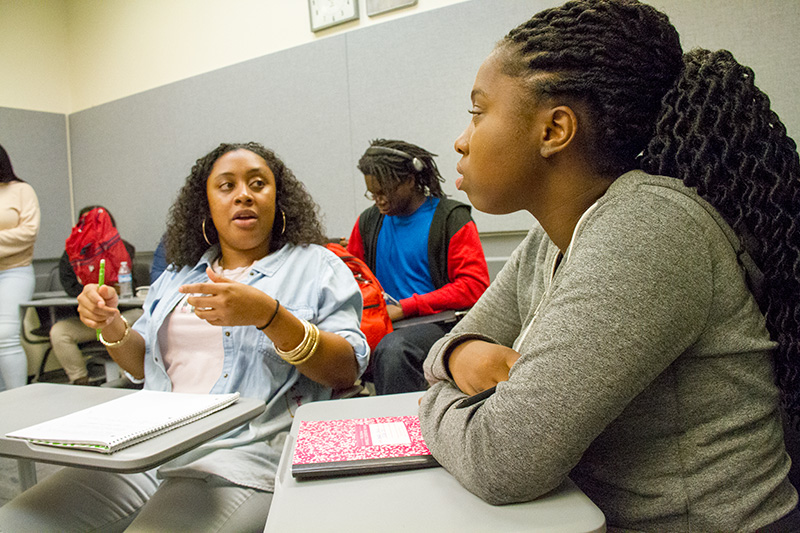What is Philosophy?
Philosophy concerns the study of fundamental questions that arise in different areas of human experience, thought, or practice. These include but are not limited to, questions such as: What is reality? Does God exist? What is good and just? What ought I to do? What is the nature of the self? Does human existence have meaning? Students who engage with these questions and are able to think and articulate viewpoints clearly and in an informed fashion not only enhance their own lives, but contribute significantly to improving their interpersonal relationships, community and society; laying the foundations for a critical and meaningful discussion about social issues, justice, politics and economics.
“The unexamined life is not worth living” – Socrates
“Philosophy is at once the most sublime and the most trivial of human pursuits” – William James
Why Study Philosophy?
Philosophy teaches some of the most essential skills that are needed to be successful in your education and workplace. Here are just some of the key skills you can learn:
- Clear and effective speaking and writing
- Argumentation
- Critical thinking
- Higher order thinking
- Problem solving and decisions making
- Ethical decision making
Philosophy also allows us to:
- Talk about the big questions
- Tackle difficult social and moral problems
- Become better people
- Find out how to best live our lives
“There is only one good: knowledge; and one evil: ignorance” – Socrates
Careers in Philosophy?

“One cannot conceive anything so strange and so implausible that it has not already been said by one philosopher or another” – René Descartes
One myth is that you can’t get a job with a Philosophy degree. This simply isn’t true.
Philosophy is about thinking bigger than just one career. Unlike focused degrees or certificates, there is no one to one relationships between a philosophy degree and a particular job. Instead, philosophy majors get a valuable tool kit of skills that they can take anywhere, giving them a freedom and flexibility not found in other majors. As a result, Philosophy majors find themselves in management or highly educated professions across fields.
One surprising trend arises when we look at philosophy majors as a whole.
“But there’s one humanities major whose graduates are doing quite well in the job market—and it’s philosophy majors.”
Philosophy majors throughout their lifetime have a higher median salary than any other humanities degree. And it is not just by a little bit (check the article for yourself in The Atlantic)
“We hear again and again that employers value creative problem solving and the ability to deal with ambiguity in their new hires, and I can't think of another major that would better prepare you with those skills than the study of philosophy.”
In a study of 1.2 million by payscale.com, philosophy majors have the highest median salary for any non- math intensive degree and 16th highest overall. (kaggle)
So, while we can’t say what you will do with a philosophy degree, we do know that philosophy majors are doing better than most with their degrees. Here are just some of the interesting jobs philosophy majors find themselves doing:
Law

Completing an undergraduate degree in philosophy has been demonstrated to be a successful path to becoming a lawyer. According to a study conducted by the University of Florida in 2013, students who major in philosophy were the second highest scoring major on the LSAT (UFL). It has also been shown that students entering law school with a degree in philosophy have the highest chance of completing law school out of any major.
Public Policy

When paired with a political science degree, philosophy can build the analytical and critical thinking skills needed to help shape public policy.
Political scientists study the origin, development, and operation of political systems. They research political ideas and analyze governments, policies, political trends, and related issues.
They often, research political subjects, such as the U.S. political system and foreign relations, collect and analyze data from sources such as public opinion surveys and evaluate the effects of policies and laws on government, businesses, and people.
Medical Ethics

Philosophy provides an important ethics education which can help when making difficult life and death decisions. These skills are essential in a hospital where life and death decisions are being made often.
"Medical ethicists study morals and values related to the practice of medicine. They integrate ideas from history, philosophy, theology and sociology in order to make judgments about treatment options and medical research. They may work as professors in universities or as private consultants for medical institutions and other healthcare-related organizations."
According to zippia.com these are the 20 most common first jobs for philosophy majors:
Assistant Manager, Teacher, Volunteer, Research Assistant, Manager, Teaching Assistant, Sales Representative, Server Office Assistant, Project Manager, Store Manager, Instructor, Tutor, Office Manager, Team Leader, General Manager, Legal Assistant, Barista, Account Executive, Substitute Teacher

